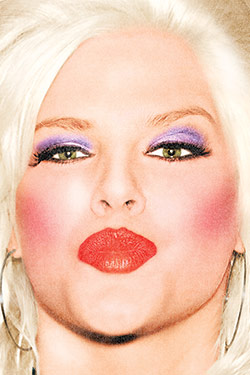 |
(Photo: Richard Corkery/NY Daily News Archive via Getty Images. Photo-illustration by Gluekit) |
Here’s a familiar plot: A venerable opera company begs a well-known composer for a new work; he delivers a raucous score about a defiantly sexual woman who finds love, glamour, and early death. A few critics grumble about vulgarity sullying the lyric stage, but theatrical audacity wins them over, and the piece goes on to triumph. Carmen and La Traviata had trajectories like that. So has Anna Nicole, the 2011 work that had its world premiere at London’s Royal Opera House, in the same exuberantly gaudy production by Richard Jones that will be brought in by BAM and New York City Opera this fall.
The music’s sparkling raunch made it an event far beyond the opera world. Companies here looked on in envy as a British team commandeered an American saga. But one person who remains unconvinced by the work’s success is its composer. “If I’m really honest, I’m quite uncomfortable with it now,” says Mark-Anthony Turnage. “I don’t think we were trying to be cruel. But it’s mocking someone’s real life. I wouldn’t do it again.”
Yet that’s exactly why Turnage and librettist Richard Thomas decided to write an opera about Anna Nicole Smith in the first place: She wasn’t fictional, highborn, or antique. She was Vickie Lynn Hogan, a high-school dropout who worked in a strip club and bemoaned her flat chest. (In the opera, the chorus shouts: “You need to get some tits!”) Equipped with new breasts and a new name, she climbed the ladder of celebrity from Playboy Playmate to wife of an 89-year-old billionaire. Rich, young, and quickly widowed, she became a tabloid obsession and a reality-show star, dying of a drug overdose at 39. “The more we researched her, the more we liked her,” the composer says. “She lived a lot in a short amount of time. If you come from a working-class background, as I do, you have to work twice as hard. In England, there’s the Oxbridge secret club, and I snuck in. [Smith] came from a dirt-poor background and became famous and wealthy, so she can’t have been that stupid.”
Though Turnage says he identifies with Smith as an outsider made good, he may be exaggerating the parallel. The composer has abetted the press in playing up his plebeian origins, to his family’s distress; if he bypassed the British class system, it was by working his way through the Royal College of Music and a privileged artistic career. Still, he insists that his struggles to make a mark on the world parallel Smith’s: “She was very determined, from the early days when she had the boob job. She’s quite impressive, really.”
To tackle this epic, Turnage, already well known for his strongly flavored and violently titled scores (his catalogue includes Twice Through the Heart, Blood on the Floor, and Three Screaming Popes), knew he needed to avoid all operatic preciousness. That’s when he teamed up with Thomas, who was best known as the co-creator of the proudly profane musical Jerry Springer: The Opera.
Anna Nicole opens in the tiny Texas town of Mexia (“It’s pronounced Muh-hay-a,” Anna and the mayor tell the chorus), a trashy wonderland of roadside joints and piggish truckers. In many ways, though, the piece is supremely traditional. The protagonist is dissolute and doomed—just like most operatic heroines. Musical slumming, like the first act’s strip-club scene, has an impeccable pedigree, too: Mozart’s Don Giovanni enjoys popular ditties with his meal, Carmen sways to a vampish seguidilla, and Berg’s Wozzeck dances to a barroom piano. Honky-tonk spectacle and wry humor that turns tragic before the final curtain are operatic staples, too.

